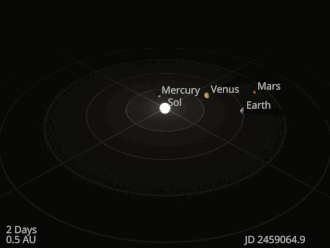
A year is the time taken for astronomical objects to complete one orbit. For example, a year on Earth is the time taken for Earth to revolve around the Sun. Generally, a year is taken to mean a calendar year, but the word is also used for periods loosely associated with the calendar or astronomical year, such as the seasonal year, the fiscal year, the academic year, etc. The term can also be used in reference to any long period or cycle, such as the Great Year.[1]
Due to the Earth's axial tilt, the course of a year sees the passing of the seasons, marked by changes in weather, the hours of daylight, and, consequently, vegetation and soil fertility. In temperate and subpolar regions around the planet, four seasons are generally recognized: spring, summer, autumn, and winter. In tropical and subtropical regions, several geographical sectors do not present defined seasons; but in the seasonal tropics, the annual wet and dry seasons are recognized and tracked.